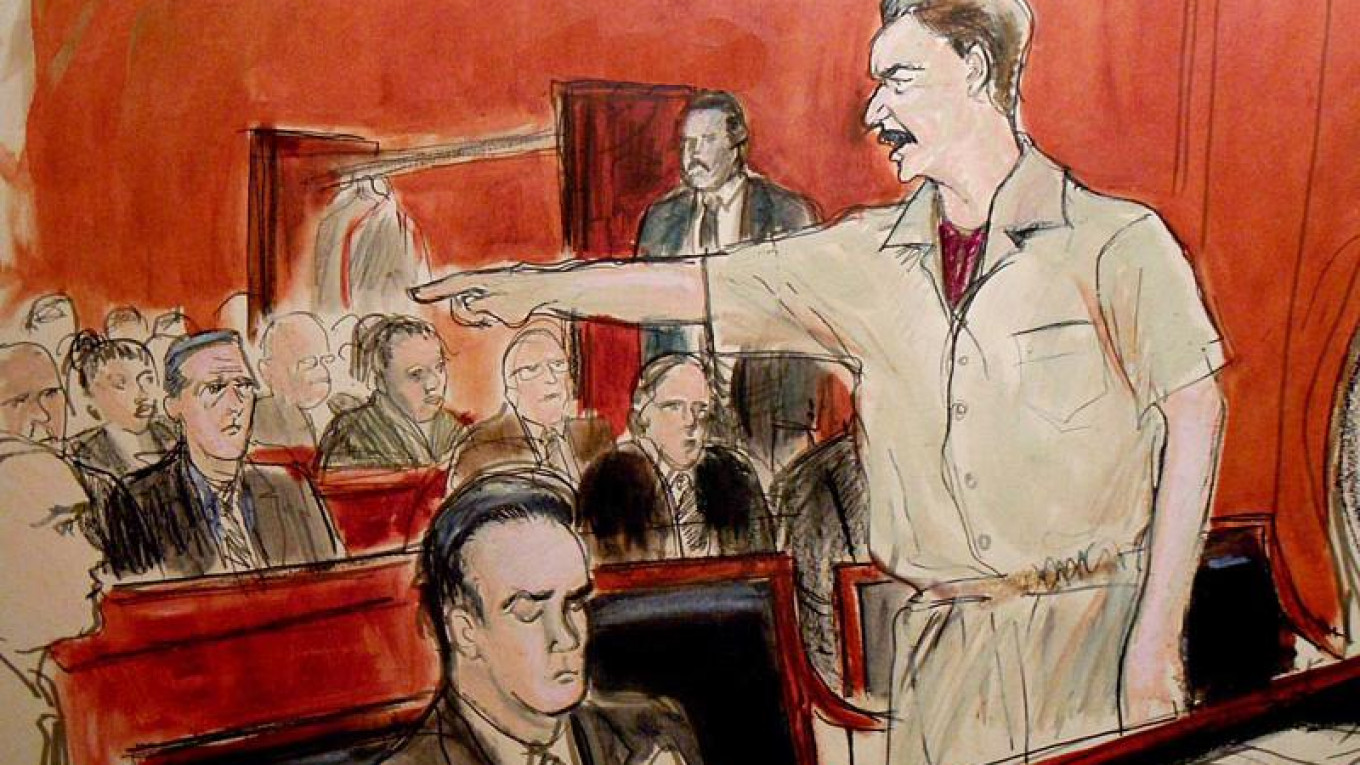It was a bold, but effortless heist.
Three men, posing as gemstone buyers for a wealthy client, walked into the Moscow offices of an Indian-owned diamond dealer. They talked their way into the firm's vault. After all, they needed to inspect the merchandise. Once the steel hatch was opened, one of the men stepped out to call his client. Shortly afterwards, four men draped in camouflage and wielding assault rifles stormed into the building.
The armed men claimed to be officers of Russia's Federal Security Service (FSB). They were conducting a raid on illicit gemstone trading, they said. Those present were told to drop to the ground. And the so-called officers went off with some $2.8 million worth of jewelry, and 600,000 euros ($670,000) in cash.
The robbery took place in August 2010. When investigators finally got around to prosecuting two years later, their attention fell on Russian-American businessman Gennady Klotsman. He was eventually sentenced by Moscow's Lefortovo Court to 10 years in a Russian penal colony.
It wasn’t, as turns out, Klotsman's first run-in with the law. Back in the United States, he also had interesting friends with alleged criminal and political connections. But Klotsman wasn’t the kind of guy who usually makes headlines, and his arrest went mostly unnoticed in the Russian press. He looked set to serve out his sentence quietly, and to see freedom again sometime in 2022.
But earlier this month Klotsman was thrust from
relative anonymity by news that he was one of a list of 13 Americans
in Russia that Moscow was looking to exchange for two of its own
imprisoned in the United States.
Unusual Trade
Under normal circumstances, this might be an easy swap: thirteen of yours for just two of ours. But, the two men in question were not easily swappable. According to a Foreign Ministry document cited by Izvestia newspaper on Aug. 3, Russia went straight for the top of its wish-list: the infamous international arms dealer Viktor Bout and a drug-running pilot, Konstantin Yaroshenko. These are men who may or may not have dirt on Russia's leadership.
The U.S. Embassy in Moscow declined to comment on the exchange proposal, but confirmed Klotsman is in Russian custody. The proposal cited by Izvestia was, however, confirmed in part by the Russian Foreign Ministry.
“The details still need to be discussed confidentially,” Deputy Foreign Minister Sergei Ryabkov told the RIA Novosti news agency on Aug. 3. “[But] Yaroshenko is one of those we would like to see released under this scheme, as well as Bout.”
Both Russians were seized in sting operations far beyond Washington's traditional territorial jurisdiction. Yaroshenko was arrested in Liberia in 2010 on charges of conspiring to smuggle $100 million of cocaine into the U.S. Bout, the more significant figure, was arrested in Thailand two years earlier.
“Bout is an absolutely fascinating and unique figure, in that he was indeed a legitimate businessman in not always entirely legitimate industries. As far as I'm concerned, he was also an intelligence asset,” says Mark Galeotti, an expert in Russian security services and organized crime. “He's a guy who knows a lot of inside stuff, so while he isn't cooperating now, they fear he one day might.”
Bout, who ran a global arms running empire, disputes aspects of his arrest. Both he and the Russian government claim he was tricked into saying he could supply Columbian FARC rebels with anti-aircraft missiles. Bout maintains that any statement made was merely hypothetical, an expression of his confidence as a logistics genius.
There has long been speculation that Bout, and Yaroshenko to a much lesser extent, had ties with Russian intelligence agencies, specifically the GRU. According to Dr. Karen Dawisha, an expert on Russian organized crime and corruption, “Bout was running an off-the-books international arms trade (and drug trade), with cash going to Igor Sechin,” a close friend and ally of President Vladimir Putin.
Such allegations are difficult to prove, and so far nothing has stuck. But the speculated Bout-Sechin link may have motivated the arms dealer's arrest and subsequent 25-year sentencing. Just last week, Bout's wife Alla said the United States offered him a reduced sentence and cozy life in America in exchange for information on Sechin. Bout refused, and the United States threw the book at him.
Alla Bout did not reply to a request for comment.
Interesting Friends
Precisely why Russia might think the U.S. would trade Bout and Yaroshenko for a dozen unidentified Americans and Klotsman is, at first glance, hard to understand. That is before you look deeper into Klotsman's background. There, you see a rich history of fraud and shady business dealings, much of it with another Russian-American businessman, Felix Sater.
When Sater was eight years old, his family emigrated to Brighton Beach, a popular neighborhood for Soviet expats in New York. His father is said to have Russian mafia connections, according to Dawisha. Sater himself has well-publicized links to real estate developer and presidential candidate Donald Trump. His business cards identify him as a senior advisor to Trump.
Sater and Klotsman appear to be old friends. At a
New York bar in 1991, Sater earned his first run-in with the law when
he stabbed a commodities broker in the face with the stem of a broken
margarita glass. Klotsman was drinking with him that night.
In 1993, the two took control of a brokerage firm called White Rock Partners, which the two used to defraud investors to the tune of almost $40 million.
The men pleaded guilty in 1998, but this is where things got weird. Both were in Moscow at the time, according to a 2007 story by The New York Times, and both brokered deals. Sater reportedly bought his freedom by digging up information on black market missile sales for the CIA. Klotsman testified against 19 of his accomplices in the fraud scheme, six of whom had mob ties.
Once off the hook, Klotsman returned to Moscow. According to Russian media reports, it was here that he reconnected with Russian gemologist Samuel Davidyants, who he first met in Israel in the early 2000s. Klotsman then supposedly asked Davidyants to procure $1 million in diamonds per month for an unnamed buyer. Davidyants helped him, and was allegedly one of the three men who talked their way into the vault in August 2010.
Klotsman's name is the third to appear in the Russian press as a possible trade for Bout. And even with his colorful history, past history suggests he will not be deemed worth the trade. Previous suggestions are said to have featured NSA whistleblower Edward Snowden, and Ukrainian pilot Nadiya Savchenko.
That is, of course, provided a certain candidate does not confound polls to win the U.S. presidential election in November.
A Message from The Moscow Times:
Dear readers,
We are facing unprecedented challenges. Russia's Prosecutor General's Office has designated The Moscow Times as an "undesirable" organization, criminalizing our work and putting our staff at risk of prosecution. This follows our earlier unjust labeling as a "foreign agent."
These actions are direct attempts to silence independent journalism in Russia. The authorities claim our work "discredits the decisions of the Russian leadership." We see things differently: we strive to provide accurate, unbiased reporting on Russia.
We, the journalists of The Moscow Times, refuse to be silenced. But to continue our work, we need your help.
Your support, no matter how small, makes a world of difference. If you can, please support us monthly starting from just $2. It's quick to set up, and every contribution makes a significant impact.
By supporting The Moscow Times, you're defending open, independent journalism in the face of repression. Thank you for standing with us.
Remind me later.






